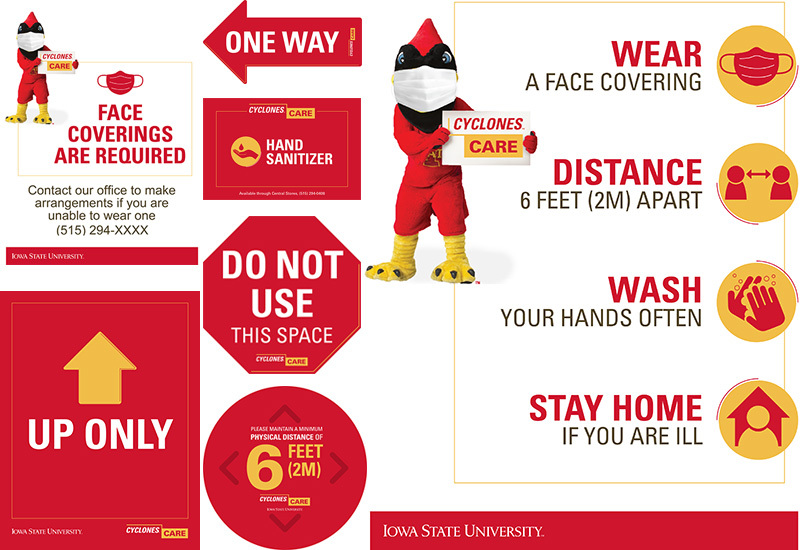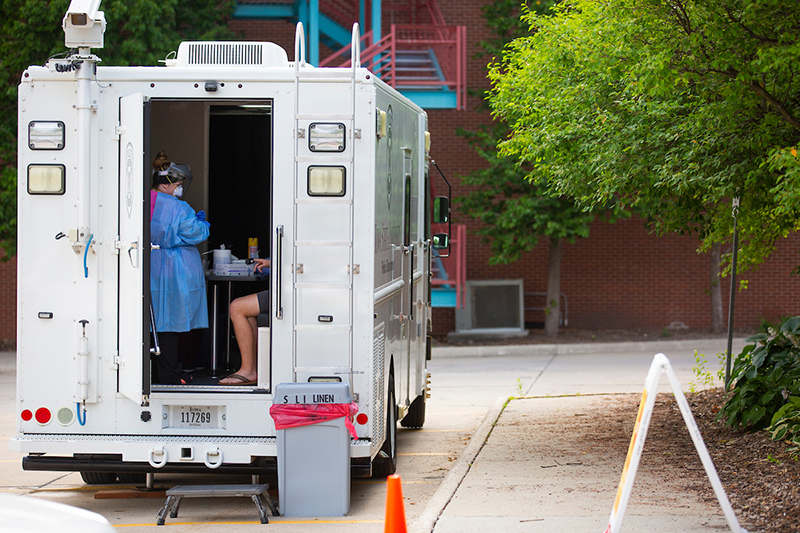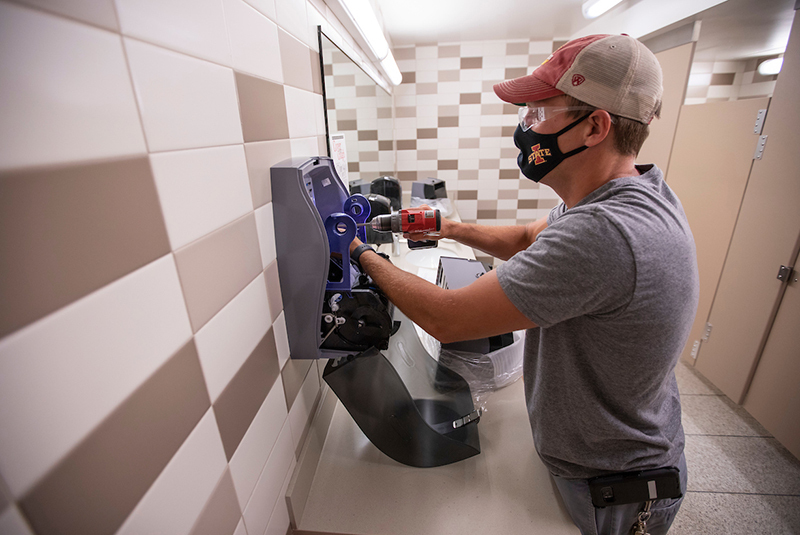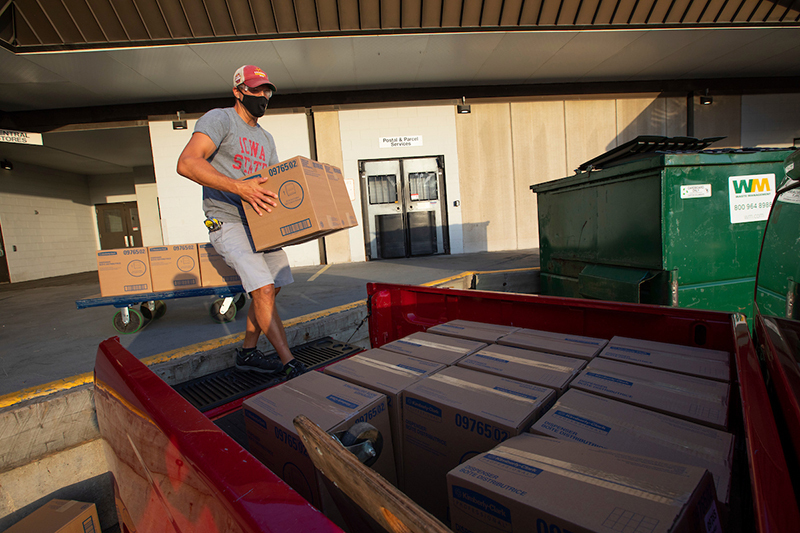Cyclones Care campaign kicks off with building signage
A campaign emphasizing four healthy behaviors launched last week with a collection of fundamental signage for university facilities. It's the initial step of a central “Cyclones Care” behavior messaging campaign that will expand into digital and promotional materials.
The Cyclones Care campaign provides a consistent look and message for materials that reinforce four priorities:
- Wear a face covering
- Wash or sanitize hands often
- Maintain physical distancing of at least 6 feet (2 meters)
- Stay home when ill
Cyclones Care signage
There's a sign for that
The campaign's first step -- providing fundamental signage for university facilities -- is well underway. Facilities planning and management (FPM) is working with building supervisors to coordinate signage needs. This goes hand-in-hand with building adjustments that minimize contact, such as occupancy limits and pedestrian traffic flow.
"As we work toward reopening campus, we're addressing the needs of the community. Encouraging people to “Keep Right” in our hallways, just like we do on the road, will help provide safe movement through campus," said Kerry Dixon, facilities sustainable design and accessibility coordinator in FPM.
Departments and units should work with building supervisors on internal signage needs. The pool of fundamental signage includes simple messaging that can be used in multiple locations, with attention to accessibility compliance.
The fundamental signage is centrally funded and only available through orders placed by building supervisors. FPM staff will install signage for exterior doors, restrooms, elevators and general classrooms. Residence and ISU Dining staff will handle installation in their facilities.
"We need to be compliant with all building and accessibility codes," Dixon said. "We want to think about how to direct traffic through a building when not everyone can take the stairs, or avoid unintentionally sending people outside and around a building to get to a restroom or elevator."
Additional options may be added to the pool of fundamental signs if needed. Custom signs can be ordered through printing services, but are not centrally funded.
Print-and-go signs
Many of the fundamental signs also have office printer-friendly versions that are available for download on the COVID-19 response website. Editable PDF versions can be customized with office phone numbers or room occupancy limits. Signage printed and used locally should only be posted with masking tape or painter's tape to avoid damage to walls and surfaces.

Examples of signs created for different purposes and spaces, including stairs, hallways, floors and furniture. A few editable PDFs are available for download to customize and print locally.
Employees need to self-report a positive COVID-19 test

Certified medical assistant Brittany Turner, Thielen Student Health Center, conducts a COVID-19 test with a patient this week in an ISU Police mobile command unit parked in the health center's north lot. University employees and students are able to get a COVID-19 test at the health center if they meet test guidelines set by the Centers for Disease Control and Prevention. Faculty and staff should fill out the online pretest form and clinic staff will follow up with them. Students should call 294-5801 and discuss their symptoms with a health care professional to determine if they qualify. Photo by Christopher Gannon.
To assist with contact tracing and providing health support, faculty, staff and students need to complete an online form if they test positive for COVID-19.
In a June 26 message to the Iowa State community, Erin Baldwin, interim senior vice president for student affairs and director of Thielen Student Health Center (TSHC), outlined the safe process for responding to positive cases and contact tracing on campus. Baldwin stressed the importance of self-monitoring for symptoms of COVID-19, and staying home if you are not feeling well.
"The reporting process is confidential and a way we can ensure employees or students get the help and support they need," Baldwin said. "Reporting will help us maintain a healthy campus community."
Response to positive test results
Members of the ISU public health team -- an interdepartmental team managed by TSHC -- are notified when positive cases are reported through the online form. Team members then contact the individual to answer questions, provide health information, resources and guidelines from the Iowa Department of Public Health (IDPH) and federal Centers for Disease Control and Prevention.
Baldwin said anyone who tests positive must self-isolate. Information about COVID-19 leave is available on the university human resources website. The public health team also will notify the employee's supervisor, who may reach out to provide support. Supervisors also may send a note to colleagues in the impacted unit to alert them to the positive COVID-19 case, but the identity of the employee who tested positive must stay confidential.
In the case of a positive COVID-19 test for students living in university housing, notification is provided to the residence department.
A workflow chart provides an illustration of the response process.
Plans for testing and contact tracing
TSHC and the Veterinary Diagnostic Laboratory, located at the College of Veterinary Medicine, are developing plans for testing faculty and staff on campus. In a June 24 letter, President Wendy Wintersteen said the public health team is working on a comprehensive plan for COVID-19 testing and contact tracing to identify others who may have been exposed. An announcement will note when this process goes live sometime this month. In the meantime, Story County Public Health and Iowa Department of Public Health will continue to provide contact tracing.
In the contact tracing process, staff reach out to individuals who test positive and ask about close contacts based on the IDPH's definition. Staff then notify those contacts they have been exposed to a positive case and provide guidance for quarantine.
Questions about the response process or other COVID-19 issues, may be sent to COVID-19@iastate.edu.
Units will clean their offices so custodians can focus on priority cleaning this academic year
Facilities planning and management (FPM) will hire as many as 71 temporary custodians to help clean and disinfect academic and administrative buildings during the 2020-21 academic year. Cleaning efforts will focus on four priorities: classrooms, restrooms, common spaces and Parks Library, so cleaning office and administrative workspaces will be left largely to the employees who work in them.
By the time fall semester begins, FPM custodians, spread between two shifts (4 a.m.-12:30 p.m. and 3-11:30 p.m.), will provide enhanced, more frequent service Monday through Friday that targets the four priorities in general university buildings. That service will look like this:
- Common areas -- including corridors, atriums, stairwells and elevators -- will be fully cleaned once a week. Frequently touched surfaces, such as door handles, drinking fountains, stair rails and elevator buttons, will be cleaned and disinfected daily.
- Restrooms will be cleaned and disinfected every day.
- Instructional spaces -- including classrooms, auditoriums, teaching labs, open labs and seminar rooms -- will be cleaned and disinfected every day.
- Parks Library -- high-use areas will be cleaned and disinfected two times per day.
The first additional custodians will start as early as July 14, and FPM custodial services manager Michelle Lenkaitis said the goal is to have 50 trained and in custodial rotations when fall classes start Aug. 17. Noting a steady turnover rate generally in the profession, she said she anticipates hiring will continue into the school year.
University senior leaders approved the temporary initiative and will seek reimbursement from the Federal Emergency Management Agency. As part of the same effort, the residence department will hire 17 temporary custodians to help with daily cleaning and sanitizing in residence halls and apartments.
Lenkaitis said FPM's 12 custodial teams aren't enough to provide the daily cleaning and sanitizing demanded by COVID-19 precautions.
"Our custodians are very, very proud of Iowa State, of this campus, and they want to satisfy their customers," Lenkaitis said. "With all the new cleaning requirements, particularly the separate task of disinfecting, they know some spaces won't look the same -- and they're struggling with that.
"But, alongside the temporary custodians, they'll be working hard in these priority areas, adding a layer of service to help people feel safe this school year," she said.
Occupants will clean office areas
The new cleaning specifications will consume a lot more custodial time. For example, classroom cleaning will jump from weekly to daily, and add disinfecting to cleaning. As a result, custodians will be forced to not do other cleaning responsibilities, Lenkaitis said.
From August to mid-May, custodial staff won't clean office and administrative spaces -- including offices, conference rooms, study and meetings spaces. Instead, departments need to purchase supplies and clean their spaces, including vacuuming or mopping floors. Cleaning/disinfection supplies may be purchased through central stores, and cleaning and disinfection procedures for employees are online. Employees should contact their custodian for trash bags and to coordinate use of a vacuum. Lenkaitis said each building floor will have collection point(s) for trash and recyclables. Units may submit service requests for special circumstances, for example, a large carpet spill. Custodial teams will try to catch up on floor cleaning after fall semester concludes, she said.
Temporary service reductions this month
In response to anticipated budget reductions in the new fiscal year that began July 1, FPM custodial services plans to eliminate 15 of its approximate 130 custodian positions through attrition, Lenkaitis said. These budget plans have been in development even as plans were being made for adding temporary help. With campus less occupied and in-person classroom teaching not offered this summer, and until temporary custodians are on board, FPM announced its teams will clean less frequently in general university buildings, effective July 1 through early August. This means:
- Restrooms will be cleaned three times a week with daily spot checks.
- Corridors will be cleaned once a week.
- Offices will be cleaned every four weeks.
Determining the accuracy of your new P&S job profile
A key piece of implementing the new market-based classification and compensation system for Iowa State's 3,200 professional and scientific (P&S) staff is for employees to affirm their assigned job profile (or title). That process has begun with job titles shared in emails to managers (June 22) and employees (June 29).
The next step is a candid conversation between employee and manager. The key question for them is: Does the assigned job profile accurately reflect the majority (50% or more) of the work I do and the responsibility placed in me, said Emma Mallarino Haughton, classification and compensation director in university human resources (UHR).
If the answer is yes, the profile assignment is final and nothing more needs to be done. If the answer is no or even maybe not, the employee or manager may request a title review. This additional review is optional, Mallarino Houghton noted.
"We want to ensure that the job profile assigned to an employee is the best possible fit. However, we also want to be sure managers and employees understand that the job profile is not intended to be a perfect match," Mallarino Houghton said. "It should describe the primary functions of the job and level of work as accurately as possible."
Exemption status
A requirement of developing job profiles in the new system was reviewing the exemption status of each for compliance with the federal Fair Labor Standards Act. In collaboration with university counsel staff, UHR staff determined 69 of the 588 new P&S job profiles are considered nonexempt based on the duties performed, not salary (though employees must meet federal standards for both to be deemed nonexempt). Mallarino Houghton said a request for review also would be the way to ask for a second look at an employee's exempt/nonexempt status.
"In this scenario, the rationale for another status should be clearly articulated in the request for review, and UHR will take specific steps in partnership with the office of university counsel to ensure this review happens as holistically as possible," Mallarino Houghton said.
She noted that requesting a review does not guarantee a change in an employee's job profile or exemption status. But it is the avenue for asking the question.
Does it fit?
Mallarino Houghton urged employees and managers to be cautious about making comparisons to other employees across the university as part of their job profile discussion. She said misclassifications exist in the 28-year-old current P&S system that will retire soon. She also said the new jobs structure contains more job profiles and offers more classification options, so employees currently in the same classification may be assigned to more accurate -- but different -- job profiles in the new system. And, as the university uses the new classification and compensation system, employees who view themselves now as similarly situated may not be over time.
"Variables such as an employee's experience and performance, or a unit's need for a particular level of work would inform the growth of a position, for example, the level of complexity needed for the same job in a large or complex unit versus a smaller, less complex unit," Mallarino Houghton said.
Assessment window
Friday, July 24, is the deadline to submit a profile review and/or FLSA exemption status review request. The request form is online, and it asks the submitter to indicate the primary reason(s) a job profile assignment is inaccurate and provide a brief supporting rationale. Employees submitting a request for review need to confirm they've discussed their job title assignment with their manager.
For those P&S employees who request a review by the deadline, here's what happens next:
- UHR classification/compensation routes the request to the local HR service delivery team, which contacts the employee and manager separately for more information and discussion.
- HR service delivery team sends its conclusion back to UHR classification/compensation for a final review.
- By mid to late August, UHR classification/compensation emails the final job profile to the employee, copying the manager and HR partner.
Documents to guide employees
Aids on the project's resources website that will help employees and managers assess the appropriateness of a job profile assignment are:
- Understanding the new P&S classification structure. A 15-minute video about the new P&S classification/compensation structure.
- Title discussion talking points. A summary of reminders, online resources and questions to answer.
- Title review guide (separate but similar versions for managers and employees). A step-by-step checklist for assessing the accuracy of a job profile assignment.
- Title review process chart. A summary of what should occur between the time when P&S employees learn their new job profile, and July 24, when forms are due for those who request a job title review.
- Title review FAQ. Answers to about 20 common questions on the new classification/compensation system, what changes because of it (and what doesn't), and how to request a review.
Related stories
P&S Council defines its commitment to antiracism, inclusiveness
Suspending its rules in order to hold two required readings on the same day, the Professional and Scientific (P&S) Council June 25 unanimously approved a motion to define the council's antiracist efforts to strengthen campus equity, diversity and inclusion. The council's executive committee presented the motion in light of "historic, recent and ongoing acts of anti-Black racism, police brutality and violence committed against citizens and in particular Black people and communities of color."
In addition to denouncing acts of racism, discrimination and violence; standing up for marginalized individuals and communities, and supporting university leadership and its statements denouncing racism, police brutality and violence against community members of color, by its motion the council commits to:
- Provide educational programming for P&S employees that engages them in conversations on topics such as implicit bias, whiteness, racism, marginalization and inclusion, particularly through its seminar series and annual professional development conference.
- Work to establish policies and procedures that are "more actively antiracist."
- Promote and encourage participation in campus conversations, workshops and other programming offered by the office of the vice president for diversity and inclusion to challenge individual prejudices and biases.
- Seek to place the council's vice president for equity and inclusion on the vice president for diversity and inclusion's council in an official capacity in order to strengthen the relationship and work between the two.
- Invite the ISU chief of police at least annually to present a summary of the police division's work in order to update and educate council members about the work it does.
Fall strategy
Vice president for extension and outreach John Lawrence, who chairs the fall planning committee that meets daily, said the university's overall strategy for fall has three components:
- Campus plans for testing -- and contact tracing and case management in the cases of employees or students who test positive for COVID-19 to reduce the spread.
- Reduce the campus footprint. For students, that means moving larger classes online and reducing classroom capacity to 50% for in-person classes. Work has begun in classrooms to physically create the space needed for distancing between students. For employees, it means greater flexibility on work-from-home options.
- Personal responsibility for preventing the spread of the virus, as outlined in the new "Cyclones Care" behavior campaign. It includes four pieces: self-monitor for symptoms and stay home if you're sick; wear cloth face coverings, respect physical distancing and avoid large crowds, and personal hygiene (yourself and your work space). Lawrence said the city of Ames also will use the "Cyclones Care" messages for reinforcement around the community.
In response to a question about enforcing the face covering requirement, Lawrence said it will be important for student leaders to carry the message and get their peers to buy in and participate. While there may be supplies of disposable face coverings in classrooms for one-time needs, he said a process will be needed for "repeat offenders" among both students and employees.
P&S classification/compensation update
Director of classification and compensation Emma Mallarino Houghton, university human resources, walked council members through implementation updates on the P&S class/comp project website. The title review process began June 29, when all P&S employees received their job profiles in the new system via email. Employees, or their managers on their behalf, have until Friday, July 24, to submit an online request for title review -- only if they believe their job assignment is inaccurate.
Following resolution of all title review requests, the new P&S classification/compensation system takes effect Aug. 30. Mallarino Houghton said resources related to the compensation part of the new system will be added to the project website before then.
She said the federal Fair Labor Standards Act (FLSA) requires the university to consider the law's provisions whenever job titles are reviewed, and the office of university counsel reviewed all job profiles as part of the class/comp project. FLSA protects employees in the areas of minimum wage and overtime pay. University counsel's review identified 69 job profiles (out of 588 in the new P&S system) as nonexempt. This impacts approximately 400 employees, she said. P&S employees also may request a job title review on the basis of their FLSA exemption status.
For newly nonexempt P&S employees, salary and benefits don’t change. They become eligible for overtime pay on Aug. 30, which requires timekeeping.
Mallarino Houghton said her staff is working with the provost and research offices to determine principal investigator (PI) status in the new jobs classification system. PI status no longer will be tied to pay grade, but to jobs series -- for both automatic approval and approval via an exception. Guidelines will be shared in the coming weeks, she said.
Other reports
- Senior vice president and provost Jonathan Wickert presented highlights from his June 17 memo to employees in the academic affairs division on plans for fall instruction. In a variety of formats, he said faculty and instructors will teach more than 7,000 courses this fall.
- In her report, chief information officer Kristen Constant said IT services' work in response to the COVID-19 pandemic falls into two general categories: supporting students and teaching and learning (examples include technology for hybrid classes, Canvas templates, scanning system to record which students picked up cloth face coverings), and supporting health (examples include strengthening outdoor wireless to promote social distancing, data management for contact tracing, security for COVID-19 campus testing).
Scheduling notes
- The annual CYtation Awards breakfast, honoring 18 individual and three team recipients and originally scheduled for March, is scheduled for Thursday, Sept. 3 (7-9 a.m., Alumni Center).
- The next council meeting is scheduled for Thursday, July 9 (2:10-4 p.m. via Webex)
Coming to a campus restroom near you

FPM carpenter Justin Abbott secures a new paper towel dispenser in a Carver Hall restroom Monday. Photo by Christopher Gannon.
Carpenter Justin Abbott, facilities planning and management, spent Monday in Carver Hall -- his first "C" building in a long list of buildings -- replacing paper towel dispensers in restrooms. The front lever-triggered dispensers replace a model with a finicky finger-operated side-spin mechanism. The new model complies with requirements in the federal Americans with Disabilities Act (ADA) and can be operated with an elbow or a sleeve-covered fist to reduce human touches on shared surfaces during the COVID-19 pandemic.
From a campus inventory of 698 restrooms and lactation rooms, custodians confirmed 174 of them were equipped with a lever dispense mechanism and installed low enough on the wall to be ADA-compliant. Another 382 restrooms were targeted for the new dispensers -- and that's the group Abbott is tackling this summer, one building at a time, more than 600 dispensers in all.
And those final 142 restrooms? The inventory list isn't complete yet on this group, but another replacement phase will begin as soon as the list is updated.

FPM carpenter Justin Abbott loads a day's worth of dispensers from central stores into his truck first thing Monday morning. Photo by Christopher Gannon.
